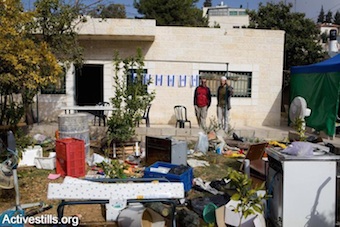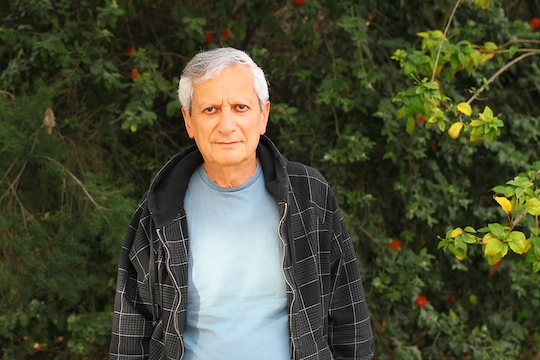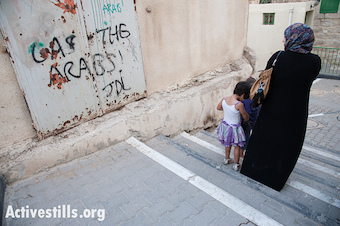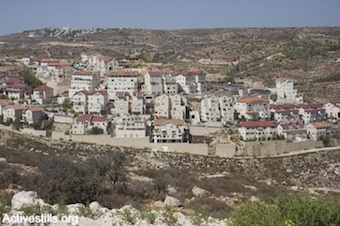In an interview, former Israeli attorney general Michael Ben-Yair says he considers the situation in Hebron a form of Apartheid, refers to ‘Price Tag’ attacks as Jewish terrorism and regrets consenting to the construction of West Bank bypass roads for settlers.
By Yossi Gurvitz, for Yesh Din
About a month ago, I met with Michael Ben-Yair for an in-depth interview offering him a chance to share his thoughts on issues of highest national importance. Ben-Yair is best known to the public as a former attorney general who served in that position under Rabin’s second government. He is also a member of Yesh Din’s Public Council. The following text is a record of our conversation, with some unavoidable omissions.
A few weeks ago, we marked the 20th anniversary of the massacre in the Cave of the Patriarchs. You were there when the government decided how to respond. You effectively approved an arrangement that you later called Apartheid. How did this happen?
In the aftermath of the Goldstein massacre, there were two important steps I believe should have been taken: one which should have been taken but never was; and another that was, but was eventually only loosely implemented. Let’s start with the thing that wasn’t done: The Jewish settlers in Hebron were not removed following the massacre.
Would an eviction have withstood the test of the Supreme Court?
There were tense relations between Jews and Palestinians in Hebron even before the massacre. The removal of the Jewish settlers was not intended as an act of punishment. The plan to evict the Jewish settlers in Hebron, which was later restricted to the settlers in Tel Rumeida, was intended for prevention rather than punishment. There was a desire to prevent the very tense relations between Jews and Muslims in Hebron following the massacre. The massacre formed part of the tension that had already existed in the city.
I am not talking about the evacuation of the settlement of Kiryat Arba but about the Jewish settlers in Hebron, who were fairly few at this time, and about those living in Tel Rumeida. The subject was considered and ultimately not implemented for what I assume were political reasons – the desire to avoid extreme tension between the government and the settlers. But if you ask me, it was a mistake not to do it at the time because today the reality is truly anomalous: there are places such as Shuhada Street that are closed to Muslims, while the road itself is open to a handful of Jews and the soldiers who accompany them. The Muslim neighbors live in cages and have to move from house to house like animals in a compound.
This is what you once referred to as Apartheid.
Apartheid refers to segregation in the sense of one law for some people and another law for others. So if Muslims are not allowed to walk along a road and Jews are, then that’s truly Apartheid. There’s no way around it, and it’s a real pity that this situation was created.
I’m not one of those who think that Jews should be prevented from visiting Hebron. But I [do] believe that if you come to settle in the heart of a hostile social environment, and the relations in that area are certainly hostile, and even if you do not do this out of spite but out of a desire to return to ‘Abraham’s home,’ or something like that, the result will still be a serious concern of bloodshed. And that concern is the reason for this segregation. So in my opinion, the authority responsible for security and public order should think carefully before allowing Jews to settle there, thereby creating this tense relationship. That completes the part about what wasn’t done.
What was done after the massacre? We drafted a procedure for enforcing the law on settlers and imposing public order. The procedure was fiercely criticized at the time. In my opinion it enhanced enforcement rather than impeding it, and that’s just what was needed. But I am not sure how strictly this procedure was followed after my period of office.
Is there anything that you regret?
Yes – two main things. At some point the OC Central Command told me that they wanted to create security components around the settlements, including by-pass roads. What is a “security component?” It’s a fence around the settlement with a kind of road three meters inside the fence. I said, “OK, so what do you want?” He replied that they wanted this fence to be situated 50 meters from the outermost house in the settlement, in order to prevent shooting attacks. I told him that if the objective was to prevent shooting, a much greater distance would be needed. So then he said it was to prevent attacks with Molotov cocktails. I replied, “So build a higher fence. Do you realize how much land you are confiscating?”
Many of the settlements are situated on privately owned Palestinian land. An additional confiscation for this security strip is a serious disruption – the land will be taken from Palestinian farmland. Even if we claim that this is state land, we are not talking about the State of Israel. I recognize that there are security needs, but we have to apply some kind of discretion and reach a rational compromise between security needs and what the law allows. This is a matter of the right to property, which is a basic right of the landowners – which the settlers are not.
I told him that in my opinion five meters from the outermost house was sufficient, though that is a lot of land. In some places there are deserted areas and there is no reasons why the fence should not be closer. The argument went on for months until Rabin – this was before his assassination – took me to one side during a reception at his home and told me to resolve the matter. So I agreed to compromise on 25 meters, though I did so with a very heavy heart because I knew what that entailed. I’ve been told that after I left the position the fence was moved out to 400 meters; I don’t know how true that is.
I regret those 25 meters. It was too much – it wasn’t the right decision. The settlers didn’t even want the fences, because they restrict the settlement’s expansion. They wanted the area to be wide open. So my position wasn’t about what the settlers want, but a critical position based on what should be genuine security needs. Why do you need a fence at a distance of 50 meters when it means taking land from someone who won’t be able to farm it anymore?
And what was the problem with the bypass roads to the settlements?
The bypass roads are an extremely serious problem. In this case, despite my self-criticism and anger, I was more ‘generous.’ I accepted the argument that bypass roads were needed in order to prevent settlers driving through Arab villages. The army argued that the settlements were a fact on the ground. Neither they nor I had built them, but they exist and we have to respond to their security problems. They need to drive from one place to another – many of the settlers work in Jerusalem or inside the Green Line. At present they have to drive through Arab villages, and this means that the journey is dangerous. I accepted this argument and agreed to build the roads, under various restrictions. Each case required my approval. I sat down with the maps and approved the bypass roads. Today we know that these roads are used by settlers or by the army, and that they were built on land confiscation from Palestinians. If there is anything I regret it is these kinds of issues – the violation of human rights and property rights of the Palestinians.
Freedom of incitement
I strongly regret the very liberal interpretation of freedom of expression during the period before the assassination of Rabin. I think we acted in an extremely liberal manner and argued that the statements made during the demonstrations against Rabin fell within the limits of free speech. We recognized that the statements were outrageous and annoying, but we did not feel they required criminal sanctions.
Today I believe that there is a distinction between freedom of expression and freedom of incitement. There was certainly incredible incitement at the time, and there must be limits. When expression falls into the category of racism or grave injury to the foundations of democracy – not the expression of a political opinion, but an attack on democratic foundations – then democracy must defend itself. We should have reacted much more strongly, and I very much regret this. For me, the assassination of Rabin goes beyond its political meaning. First and foremost, it was an extreme attack on the essential foundations of Israeli democracy, and in this respect I think we were a bit too liberal.
Following the Goldstein massacre, you declared the organizations Kach and Kahane Chai terrorist organizations, but their members simply re-branded themselves as “Kahane’s People” and went ahead as usual. On the other hand, the authorities have recently begun to use interrogation techniques on Israelis that were previously reserved only for Palestinians. A specific example is Yehuda Landsberg from Havat Gilad. What is your position on this issue?
After I published my opinion, and after the Shin Bet (Israel Security Agency) had provided its professional opinion as a basis for discussion and the head of the Shin Bet presented the information available at the time regarding planned activities by Kach and Kahane Chai, we recommended that the government declare Kach and Kahane Chai terrorist organizations in accordance with the Prevention of Terrorism Ordinance. The government did so. Following the declaration, we used a wide range of means, including detentions, against Kach activists – Noam Federman, Baruch Marzel, and others whose names I cannot recall. They escaped, and Baruch Marzel was arrested in Haifa. Then we prevented them from entering the entire area outside the Green Line. We took all kinds of measures and this went on for six to 12 months, and then we came to the point of Rabin’s assassination.
Do you still think it was right to use administrative detentions?
Look, administrative detention is problematic and anyone who denies that is mistaken. On the other hand, it isn’t a black and white matter either. You have to weigh things and find a balance between conflicting basic rights – and such conflicts occur frequently. One right is not to be subject to detention that is not based on evidence.
In the security sphere there can be no doubt that Kach and Kahane Chai are clear cases of security offenses. It’s Jewish terrorism. In this field you don’t always have evidence. You have intelligence information – and if you don’t use that information for the purpose of prevention when you don’t have evidence for criminal prosecution, then what’s the point of having an intelligence service?
It’s a classic problem – the contradiction between intelligence and gathering evidence.
Your aim is to provide prevention, not punishment. If you don’t restrict a given person’s freedom of movement, either with an order preventing him from entering various places or by administrative detention, then what tools do you have? Are you just going to let something happen?
Even administrative detentions, and certainly administrative detentions of Jews, are subject to judicial review. They were not detained in accordance with the Defense Regulations – they were detained on the basis of Israeli law, and this includes the obligation to bring them before a judge within a relatively short period. So there is judicial review. In some cases, this tool is vital.
You object to administrative detentions because you are thinking of a different situation – the period when thousands of Palestinians were subjected to administrative detention. Tens of thousands, even. I’m not talking about that kind of inflation in the use of administrative detentions, which is certainly intended to silence the population and I’m sure was not based on security needs or substantiated intelligence. Much of the intelligence that is received from Palestinian informants is actually about settling personal accounts, and the IDF and Shin Bet are trigger happy when it comes to these detentions. But there was no such inflation in the case of Jewish terrorism. Only a handful of people were detained. If there was evidence enabling prosecution, then of course it would be preferable to prosecute them, but the fear is of actors who can lead to bloodshed. I’m not trying to justify it; I just want to point out that sometimes there is no alternative. You cannot claim that the protection of human rights is absolute and that you don’t take into account what the consequences may be in terms of the disruption of public order. It’s the same dilemma as in the case of freedom of expression, as I mentioned earlier.
No gatekeepers: Jurists and the occupation
If I am not mistaken, during the Rabin period there was a real construction freeze.
That’s correct. Firstly, after the second Rabin government was formed it decided to change the priorities and to transfer budgets from the settlements for the development of the Galilee and the Negev. I remember that a decision was taken to freeze construction in the settlements, including internal expansion. I submitted an opinion ahead of the discussion regarding Givat HaTamar or another neighborhood (I can’t remember in which settlement) and following the discussion a complete freeze was imposed on construction, including tenders [already issued – YG].”
Did the Supreme Court approve the freeze?
I don’t think it even reached the Supreme Court. All I can remember was the sit-down strike by MK Yahalom and other members of Knesset from the National Religious Party (which still existed at the time) outside the Prime Minister’s Office. But as everyone knows, Rabin wasn’t moved by this – and he eventually paid with his life.
You were interviewed for Drucker’s series (a follow-up to the film, “The Gatekeepers”) but you weren’t pleased with the end result. What bothered you?
They interviewed me for five hours and eventually included just a few minutes. I didn’t even want to be interviewed and I didn’t think the whole business was serious. The first time Drucker contacted me, he told me, “Look, ‘The Gatekeepers’ didn’t deal with the real gatekeepers – the attorneys general are the true gatekeepers.” I told him that in my opinion it would be a very boring interview and that you couldn’t compare it to the film “The Gatekeepers.” What was interesting and important about “The Gatekeepers” was the contrast between the everyday work of the heads of the Shin Bet and the things they had to do and their own political opinions. It was a very important film, I think, particularly because the heads of the Shin Bet expressed political opinions that differ from those you would expect to hear given their functions.
This doesn’t apply in the case of the legal advisors. It’s more about gossip than any ideological impact. I don’t like the media and I even turn down offers for attractive interviews. But I told Drucker that if the other attorneys general agreed to be interviewed I wouldn’t break ranks, because that would be a bit arrogant, as if I were cutting myself off from the public. I wouldn’t exclude myself, because to do so would mean excluding others.
I thought they would raise a wide range of issues including the criminal sphere and areas that are important to me, such as the Shin Bet and other aspects of the conflict between law and security. Those are areas where my views are slightly unorthodox. For example, regarding operational accidents in the IDF, my position was that if there was negligence, the officer should be held accountable – including in the case of operational accidents and not only accidents during training, assuming there was negligence.
Or the Shin Bet and the subject of torture: during my period of office we restricted the use of shaking. My position later formed the basis for the High Court ruling in the petition submitted by the Public Committee Against Torture in Israel. We also amended the penal code and introduced a stricter penalty for a holder of custody when a subject of interrogation is injured under his custody.
In your book Sheikh Jarrah, about the neighborhood of the same name, you refer to the laws that have been used there as unjust laws. But laws must be interpreted and implemented. In “The Law in These Parts,” Ra’anan Alexandrowicz claimed that without jurists there would be no occupation. How do you see things?

When there is an unjust or a discriminatory law, the judge is entitled to say that he thinks that the law is discriminatory or unjust and violates accepted foundations. He can decline to act in accordance with the law. He cannot strike out the law, because it was enacted under the Basic Law: Human Dignity and Liberty. But otherwise the result will be unjust and irrational. A judge is not a workman; he is an artist, not a craftsman or a technician. He should create something that is right and just and use legal tools to create a just outcome.
For example, In 1950 the Absentee Property Law was enacted. The law effectively establishes that properties held by residents who had fled to an enemy country or territory at the time the law was enacted are defined as absentee properties and transferred to the management of the Custodian of Absentee Property. In most cases, the Custodian transferred the property to the Development Authority or sold it. Prior to the enactment of the law many of these properties were known as “abandoned property” and were allocated to Jews within Israel and in West Jerusalem. For example, my family received two apartments and a shop in Sheikh Bader.
In 1970 the Legal and Administrative Administration Law was enacted, in the aftermath of the Six Day War. This law states that properties that were held by the enemy’s Custodian of Absentee Property – i.e. property abandoned by Jews who fled to the territory of the State of Israel – may be released by their historical owners, i.e. Jews, and transferred to the Custodian General. These properties can be released once the historical owner presents proof of ownership. The law was worded in a way that means that the Custodian General, who effectively acts in the place of the Jordanian Custodian of Absentee Property, has no discretion regarding the release of the property.
The third law is the Absentee Property Law (Compensation), 1973. This law establishes that an absentee who becomes a resident – in other words, an Arab resident of East Jerusalem – who held property in West Jerusalem and fled to the Jordanian-held territory and thereby became absent is entitled to request compensation for his property from the Custodian of Absentee Property. The value of the property is according to its value on November 29, 1947, with a modest and very limited revaluation that is far below the current value of the property. In other words, there is one law for abandoned Arab property and another for abandoned Jewish property. This is unjust legislation.
But these laws were not the only thing that affected the situation. What else happened in Sheikh Jarrah at the time?
We also have to consider the reality on the ground as well as the law. All the [Jews] who fled from Sheikh Jarrah received compensation from the reserve of abandoned properties in the west of the city. You can’t start preparing property surveys during a war. My cousin, who died some time ago at the age of 90, fled from Sheikh Jarrah like the rest of us and received an Arab home in Katamon. He undoubtedly received compensation that was several times the value of the property he abandoned. Even in 1948 that house was worth more than the house he fled from in Sheikh Jarrah.
In the case of Sheikh Jarrah, at least, I know for certain that everyone who fled the neighborhood received compensation from the abandoned property in the west of the city. So if you received compensation, how can you demand the historical property? You want to have the historical property and compensation? Is that moral? And then the property is sold to a right-wing association that receives support from international organizations and from Jews. By the way, the [Palestinian] residents made a mistake in court. They claimed that they were protected tenants, but they should have stated that they were the owners and that they acquired ownership during the War of Independence.
The court should act wisely. The court cannot discuss such matters on the basis of property law, but on the basis of commonsense. When we received the payment, we did not sign any waiver, but we never thought of demanding our house back. The court should accept this and rule that the law does not provide a response to a situation created by war.
You rarely give interviews but you are very active on Facebook, and the media shows a lot of interest in your page. That is fairly rare among jurists. How did this come to be?
I am already far removed from the world of law. I don’t deal in law any more. After I resigned from my position as attorney general I worked in arbitration for a while, but I no longer accept new cases. I don’t consider myself a public figure but I am involved in life; I have an opinion and I express it. I think Facebook is a good tool – I don’t belittle it. If you use it properly as a tool for communication with a wide circle of friends, it is effective. I have many Facebook friends whom I don’t know personally, but after a while I realize that we have a lot in common and that we are interested in the same subjects. I devote about half an hour a day to Facebook. My comments on my Facebook account are mainly in the political sphere, although I haven’t been a party member since 1968.
Which party was that?
Rafi (Ben-Gurion’s breakaway party from Mapai) – although today I am far removed from that party’s opinions. I was one of those who admired Ben-Gurion as a youth and as a student. I write from a human rights perspective, and I am particularly interested in the field of education. For example, I was very interested by the affair surrounding Adam Verta, the ORT school network, and Education Minister Shai Peron. The education system is in very poor shape. I am a graduate of the military boarding school in Haifa, and on my Facebook page I protested the fact that the cadets will be spending Shabbat in Efrat. Their mere presence there is a political statement. Is anyone checking what people will tell them there over Shabbat dinner with the families? This is political indoctrination of high school students in an occupied territory that is the subject of disagreement even within Israeli society. This is certainly not an appropriate way to handle cadets who will later form the backbone of the standing army. I corresponded with the commander of the school and pointed out that even the official position of the State of Israel is that this is not its territory, but occupied territory.
Thank you very much.
Written by Yossi Gurvitz in his capacity as a blogger for Yesh Din, Volunteers for Human Rights. A version of this post was first published on Yesh Din’s blog.





